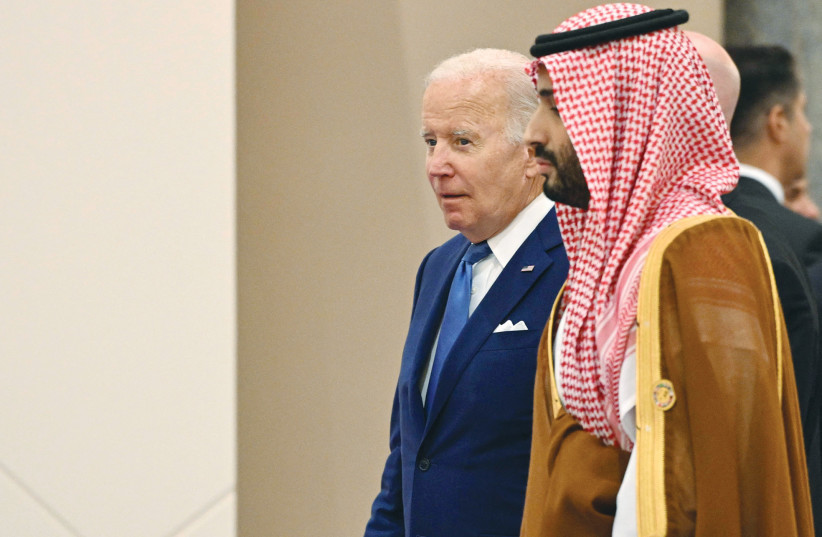The position of regional powers in the Middle East regarding Iran’s nuclear weapons has been a matter of debate for years. Historical evidence suggests that having nuclear power in a region creates a strong incentive for other countries to acquire a similar nuclear deterrent. This is to establish a balance of power that ensures stability and prevents one nuclear power from launching an attack, intimidating the other party, or trying to dominate and influence its regional context against the interests of neighboring countries.
In a recent interview with Fox News, Saudi Crown Prince Mohammed bin Salman (MBS) stated that if Iran were to obtain nuclear weapons, his country would do the same. This is an unprecedented official Saudi statement on the Kingdom of Saudi Arabia’s strategic direction in light of current regional and international developments and related developments regarding Iran’s nuclear program.
As observers, we should assume that the Saudi leadership had considered two options, each with a different rationale and outcome when deciding its intentions on this sensitive issue: to pursue a policy of ambiguity or one of transparency and direct declaration of the Kingdom’s position on a complex regional security issue such as Iran’s nuclear program.
From a strategic perspective, MBS’s openness is the most likely and reasonable way to handle the situation. He cannot afford to allow speculation to diverge in various directions, some of which certainly do not serve Saudi Arabia’s interests or its short- and long-term strategic goals. Moreover, encouraging such speculation could lead to renewed tension in Saudi-Iranian relations, which we believe neither country wants after the recent rapprochement.
Nuclear arms would lead to increased tension
Nuclear ambiguity would not serve Saudi Arabia, which mainly seeks security and stability. It has focused on resolving problems at the regional level to prepare the environment for implementing its ambitious 2030 development vision. Therefore, clarity and transparency seem necessary at this stage so that the Saudi leadership does not face an unexpected situation that could upset its calculations or change the regional power dynamic.

This could lead to new regional tensions in addition to those that already exist, some of which Saudi diplomacy has successfully cooled while continuing to deal with others on the way to achieving its goals of regional security and stability.
It is no secret that Iran’s ownership of nuclear weapons would trigger a nuclear arms race among all the countries in the region, for obvious reasons, related partly to Tehran’s policies and orientations, but also to the traditional calculations of all states, especially the requirements of conventional and non-conventional balance of powers in such circumstances.
Saudi Arabia’s conditional statement sends a message to all parties about the scope and limits of its involvement in the nuclear issue. This stance reflects the policy of a responsible state committed to international laws, principles, and treaties.
However, this is not just a Saudi direction, but a stern message to all parties involved that the possession of nuclear weapons is a threat to regional peace and stability. Working to prevent this from happening is a top priority and must be sought by all in order not to open the door to scenarios of a nuclear race in one of the world’s most sensitive regions.
Saudi Arabia’s stance on acquiring nuclear weapons if Iran obtains them is similar to other positions around the world. South Korea, for example, sees this approach as reducing the likelihood of nuclear war on the Korean Peninsula. A similar situation has occurred at times between India and Pakistan, where the balance of power is believed to have deterred either side from resorting to nuclear threats, let alone actually using them.
It is well known that peaceful nuclear technology for power generation or for scientific and research purposes is a right of all countries – guaranteed under international law – as long as nuclear reactors are built according to recognized safety standards under International Atomic Energy Agency (IAEA) control. It is a legitimate knowledge and capacity development (KCD) that must not be converted into a military nuclear power under international law. If any party were to make such a conversion, it would confront regional powers with a new geopolitical reality in which self-defense against any potential threat or danger becomes paramount.
Regarding nuclear weapons in the Gulf region, MBS said, “We don’t want to see that,” expressing a strategic conviction, firmly rooted in Saudi Arabia, about the importance of regional security and stability. He further said, “It’s a useless effort, to reach a nuclear weapon, because you can’t use it. If you use it, you’re going to have a big fight with the rest of the world,” pointing out that the international community “cannot see another Hiroshima.” This unwavering conviction, of course, is not inconsistent with safeguarding Saudi Arabia’s security and its interests in ensuring a balance of power when necessary.
MBS’s statements on nuclear weapons are mainly a warning to those concerned about the peril of nuclear weapons. They do not contradict the atmosphere of cross-Gulf rapprochement between Riyadh and Tehran. On the contrary, they aim to consolidate and maintain that rapprochement.
Moreover, such calculations and strategic positions of countries are not primarily tied to the regional environment and the current state of neighborhood relations, but to ensuring the long-term security and interests of the country.
The writer is a UAE political analyst and former Federal National Council candidate.
